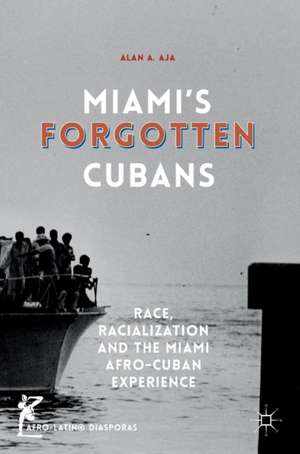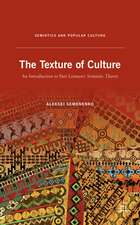Miami’s Forgotten Cubans: Race, Racialization, and the Miami Afro-Cuban Experience: Afro-Latin@ Diasporas
Autor Alan A. Ajaen Limba Engleză Hardback – 31 aug 2016
Preț: 389.49 lei
Nou
Puncte Express: 584
Preț estimativ în valută:
74.54€ • 77.38$ • 62.15£
74.54€ • 77.38$ • 62.15£
Carte tipărită la comandă
Livrare economică 24 martie-07 aprilie
Preluare comenzi: 021 569.72.76
Specificații
ISBN-13: 9781137575234
ISBN-10: 1137575239
Pagini: 236
Ilustrații: XXVI, 240 p. 1 illus. in color.
Dimensiuni: 148 x 210 x 21 mm
Greutate: 0.45 kg
Ediția:1st ed. 2016
Editura: Palgrave Macmillan US
Colecția Palgrave Macmillan
Seria Afro-Latin@ Diasporas
Locul publicării:New York, United States
ISBN-10: 1137575239
Pagini: 236
Ilustrații: XXVI, 240 p. 1 illus. in color.
Dimensiuni: 148 x 210 x 21 mm
Greutate: 0.45 kg
Ediția:1st ed. 2016
Editura: Palgrave Macmillan US
Colecția Palgrave Macmillan
Seria Afro-Latin@ Diasporas
Locul publicării:New York, United States
Cuprins
Introduction: “What if Elián was black?”.- 1 “It’s Like Cubans Could Only Be White,” Divided Arrival: Origins of a Racially Bifurcated Migration.- 2 Beyond El Ajiaco: Eviction from el Exilio (1959-1979).- 3 “You ain’t black, you Cuban!”- Mariels, Stigmatization and the Politics of De-Racialization (1980-1989).- 4 “They would have tossed him back into the sea,” Balseros, Elián and Race-Gender Matters in the Miami Latinx Millennium.- 5 From la Cuba de Ayer to el Miami De Ayer: The Cuban “Ethnic” Myth in Contemporary Context.- 6 Between “Laws and Practice,” Blacks, Latinxs, Afro-Cubans/Latinxs and Public Policy.
Notă biografică
Alan A. Aja is Associate Professor in the Department of Puerto Rican and Latino Studies at Brooklyn College, the City University of New York, USA. His individual and collaborative publications have appeared in a range of scholarly and public outlets, including Ethnic Studies Review, Social Research, Latino/a Research Review, Souls: A Critical Journal of Black Politics, Culture and Society, Dissent, The American Prospect, The Washington Post, The Nation, and New Politics. His research focuses on intra-Latinx racism, stratification economics, wealth inequality, educational inequities, economic democracy, and grassroots to policy-level responses to inter-group disparities. Prior to academia, Aja worked as a labor organizer in Texas.
Textul de pe ultima copertă
This book explores the reception experiences of post-1958 Afro-Cubans in South Florida in relation to their similarly situated “white” Cuban compatriots. Utilizing interviews, ethnographic observations, and applying Census data analyses, Aja begins not with the more socially diverse 1980 Mariel boatlift, but earlier, documenting that a small number of middle-class Afro-Cuban exiles defied predominant settlement patterns in the 1960 and 70s, attempting to immerse themselves in the newly formed but ultimately racially exclusive “ethnic enclave.” Confronting a local Miami Cuban “white wall” and anti-black Southern racism subsumed within an intra-group “success” myth that equally holds Cubans and other Latin Americans hail from “racial democracies,” black Cubans immigrants and their children, including subsequent waves of arrival and return-migrants, found themselves negotiating the boundaries of being both “black” and “Latino” in the United States.
Caracteristici
Applies the lens of race in re-framing the complex, segmented realities of the Cuban-American experience Argues that Afro-Cuban experiences of reception were vastly different than their predominantly “white” counterparts in South Florida Serves as a perfect example of how seemingly discrete locations can illustrate a myriad of the central concerns Afro-Latin@ Diaspora interrogates

















